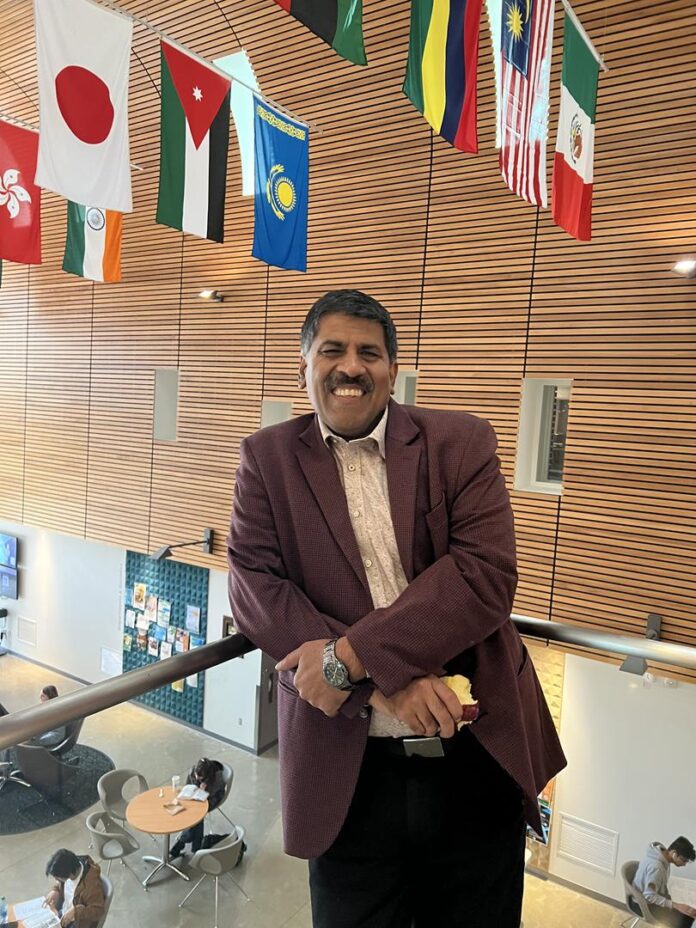If you have ever taken one of his English classes, you are no stranger to Rajnish Dhawan’s exuberant sense of humour. Whether he is quoting Seinfeld in the middle of lectures or workshopping his stand-up material in class, there is no denying Dhawan’s passion for the comedy scene.
“I teach what I do,” he noted when discussing how his work as a comedian influences his career as a professor. As an associate English professor who teaches a variety of creative writing courses at UFV, such as playwriting and screenwriting, he was quick to point out that just like other forms of creative writing, preparing material for stand-up comedy follows a similar writing and revising process.
“There is a pattern to it,” he explained. “It is the same if you are writing a play or a short story, you have an idea and you work on it. There’s a structure; a beginning, middle, end [and there are] various substructures [such as] where to punch and what punch line to use.”
“The thing with comedy, though, is that there’s a lot of workshopping right in front of [a] real audience […] That’s where open mics come in handy. You see what works and what doesn’t. There is a constant revision process. That’s what we do in writing as well. [It’s] a constant revision process until you get it right.”
Dhawan explained that preparing stand-up material goes beyond just picking up on things that appear funny at the dinner table or amongst friends in passing.
“There is some basic talent. You have to look at things from a funny angle, but then you have to work on it. It’s not just going up on stage and winging it […] You can’t get to that level of perfection until you have written it properly and rehearsed it properly. ”
Many people may hesitate to enroll in comedy courses or try out the profession because they are intimidated to perform in front of an audience. Dhawan, however, stressed the importance of repeatedly rehearsing material. He explained that this is key when it comes to building confidence, especially when sharing your creative work with others.
“It’s like in theatre. I used to dread [performing] plays, but I used to tell my actors ‘you need to feel bored with the lines.’ Practice, practice, practice […] I think it is the most difficult performing art because you have nothing except you and the microphone.”
Dhawan recently performed a nearly sold-out show at Fraser Valley Comedy at the Chilliwack Cultural Centre; an event that kick-started his career as a comedian in 2017. After writing a play in 2016 about terrorism, he recalled feeling incredibly drained and emotionally exhausted from taking on such a large task. As a way to counter these emotions, he wrote a comedy play. Shortly after that, he came across an ad in a local newspaper promoting Fraser Valley Comedy, and from there, he decided to take the plunge and try out stand-up comedy.
“Anyone who wants to do it, [Fraser Valley Comedy] is a good place to start,” he explained. “And don’t be discouraged,” he said. “If you have the guts to go on stage, half the job is done.”
“It’s not a profession unless you move to the U.S. or India, but it has a lot of transferable elements to it. It gives you the confidence to speak in front of random strangers that are high on beer and pot,” he joked.
“I can teach the structure of writing,” Dhawan explained. “[But] I can’t teach ideas. The ideas are yours. I teach how to mold those ideas into [a] formal structure so that it can become a story or something funny.”
Dhawan is hopeful that UFV will offer a comedy writing course within the next year. Interested students should keep a look out during registration season to get enrolled and put their comedy skills to the test. Just like Rajnish Dhawan, you may spark a new passion for making people laugh.
Sydney is a BA English major, creative writing student, who has been a content contributor for The Cascade and is now the Opinion editor. In 7th grade, she won $100 in a writing contest but hasn’t made an earning from writing since. In the meantime, she is hoping that her half-written novels will write themselves, be published, and help pay the bills.


